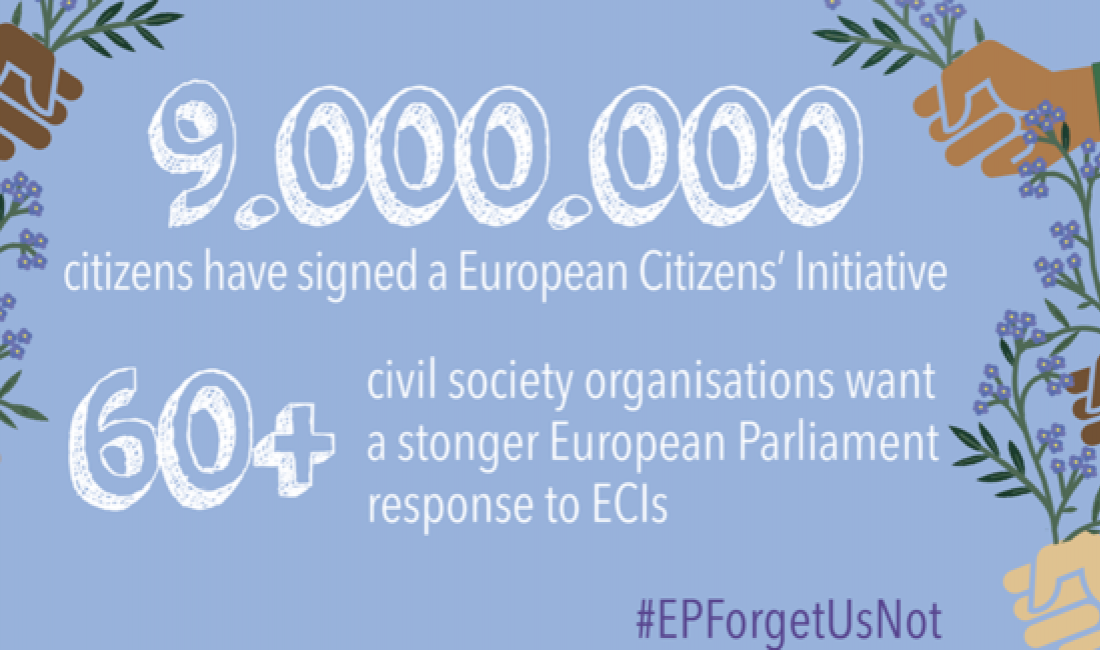On 20 June, the Constitutional Affairs Committee (AFCO) of the European Parliament will will vote on the future of the European Citizens Initiative(ECI). People2power todays publishes an open letter by civil society organisations and ECI organisers, which calls upon the European Parliament to take its responsibility for this transnational participatory instrument.
Dear Members of the European Parliament,We know that you have been waiting for this almost as long as we have been: the longoverdue revision of the European Citizens´ Initiative. Some of you may be tired of the topicbecause of the number of times you have already debated it in your House and elsewhere, with many arguments coming back over and over again. However, this is not the time to lose focus. This is your time to take your collective responsibility, to commit yourselves to this participatory instrument, and to make the ECI politically meaningful!
Only YOU can do this.We call upon you, the European Parliament, to oblige yourself to have a debate and vote in plenary on every single successful ECI before the Commission adopts its formal response.Even if the ECI is a novelty at the transnational level, it is not unique. In Latvia and Finland,they have successfully implemented citizens´ initiatives at the national level that largelyresemble the ECI. Their citizens´ initiatives seem to work reasonably well, not only in theeyes of politicians, but also in the eyes of citizens.Why can we not make the ECI work? There is a crucial difference that sets the ECI apart from these national citizens´ initiatives. Inthe latter case, it is the Parliament that is in charge of dealing with citizens´ initiativessuccessful at collecting the required number of signatures, not the government.
Why is this relevant for their success? It is not because the Parliament has always agreed with these initiatives. From the 24 successful initiatives in Finland, so far only 2 have been approved by the Parliament and resulted in a direct legislative impact. What makes a critical difference, though, is that citizens who signed a successful initiative can follow what happens with their initiative, how it is taken up and debated by their directly elected representatives and what outcome this results in. If the initiative you supported as a citizen is rejected by the MP you voted for, you may have less reason to vote for that MP in the future and vice versa.
This direct link between participatory and representative democracy is fundamental for the success of a participatory instrument, and as such it strengthens democracy overall.At European level, we have a disconnect. A successful ECI can only count on a reply from the Commission, which is not directly answerable to citizens. The months between the submission of a successful ECI and the Commission reply are like a black tunnel for ECI organisers and supporters. Citizens have no way of telling how a Commission reply has come into being and whether this can be considered a democratically fair response. This disconnect leads to a structural mismatch of expectations on the type of impact a successful ECI can reasonably be expected to have.
The European Parliament can change this. By having a debate and vote on every single successful ECI before the Commission reply, the European Parliament takes on an indispensable function of representative politics: that of democratic mediator - mediating between the expectations of citizens and the institutional reality of policy-making, between "outsiders" and "insiders". In the absence of suchdemocratic mediation, there will continue to be a disconnect between this participatory instrument and our European system of representative democracy, and the ECI will continueto result in "more pain than gain" for all parties concerned.2
We count on you during your vote on 20 June!
Democratically yours!
ECI organisers
First-ever successful ECI Right2Water
One of us
Stop Vivisection
Minority SafePack – one million signatures for diversity in Europe
Fraternité 2020 - Mobility. Progress. Europe
Central public online collection platform for the European Citizen Initiative
ONE MILLION SIGNATURES FOR "A EUROPE OF SOLIDARITY"
Unconditional Basic Income
End Ecocide in Europe: A Citizens´ Initiative to give the Earth Rights
30 km/h – making the streets liveable!
European Free Vaping Initiative
PEOPLE 4 SOIL
More than education – Shaping active and responsible citizens
Retaining European Citizenship
We are a welcoming Europe, let us help!
Civil society organizations and think-tanks:
AEGEE / European Students´ Forum
ARCI (Associazione Ricreativa Culturale Italiana) - Italy
Asociatia Pro Democratia - Pro Democracy Association (APD)
Associação ì Praça
Berliner Wassertisch
Civil Society Development Foundation Romania
Community Development Institute Macedonia
Democracy International
Democracy Without Borders
Deutscher Naturschutzring (DNR) - German League for Nature and Environment
European Association for the defence of Human Rights (AEDH)
European Citizen Action Service (ECAS)
European Citizens’ Rights, Involvement and Trust (ECIT)
European Civic Forum
European Democracy Foundation
European Federation of Public Service Unions (EPSU)
European House, Hungary
European Institute Foundation (EI)
European Think and do tank POUR LA SOLIDARITé
European Water Movement
European Youth Forum
Food & Water Europe
Forum Italiano Movimenti Acqua
Foundation for Public Participation – ManaBalss.lv, Latvia
G1000
Initiative and Referendum Institute Europe
Institute of Public Affairs (ISP), Poland
La ligue de lenseignement
Lifelong Learning Platform
Mehr Demokratie
Migration Policy Group
Nature´s Rights
Netwerk Democratie
New Europeans
Nyt Europa
Open Ministry (Avoin ministeriö¶), Finland
openPetition gGmbH
people2power.info
Solidar
Swiss Democracy Foundation
The Democratic Society
The ECI Campaign
The Good Lobby
Unconditional Basic Income Europe
Volonteurope
We are Europe! e.V.
WeMove.EU
Young European Federalists (JEF Europe)
EUGENT – Europäische Gesellschaft für Entschleunigung gUG – EuropeanAssociation for Declaration



